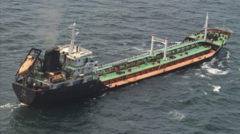Russia has reportedly provided North Korea with over a million barrels of oil since March 2024, as documented by the Open Source Centre, a UK-based nonprofit that utilizes satellite imagery analysis. This oil is allegedly being exchanged for North Korean weapons and troops that support Moscow's military operations in Ukraine, according to expert assessments and UK Foreign Secretary David Lammy's comments to the BBC. Such transfers contravene existing UN sanctions designed to restrict Pyongyang's oil imports in order to limit its military developments and nuclear weapons capabilities.
Analysis of satellite images taken exclusively for the BBC reveals that North Korean oil tankers have discreetly made 43 trips to a Russian oil terminal, coming into port with their tracking systems switched off, a practice suggesting an intent to conceal the scale of the operation. The analysis indicates that these tankers leave the Russian port heavily loaded, leading experts to estimate oil deliveries significantly exceed UN-imposed limits. Since the sanctions were established, North Korea has resorted to illicit oil acquisitions to meet its demand, with the allowed quantity of 500,000 barrels markedly insufficient for its needs.
Satellite imagery documented the first of these oil shipments on March 7, 2024, just as North Korean support to Russia intensified. Experts describe the relationship's dynamic, emphasizing how Kim Jong Un's contributions to Russia bolster Vladimir Putin’s war efforts while also providing North Korea with much-needed stability through access to oil. Former members of a UN sanctions panel estimate that these oil deliveries are fueling military operations, leading to heightened tensions not just in the immediate region but globally.
The significance of this exchange is amplified by concerns regarding military technology transfers amid the deepening cooperation between North Korea and Russia. The situation raises alarms about potential ramifications, such as enhanced military capabilities for North Korea that could threaten global stability. South Korea has expressed its intent to respond firmly to these sanctions violations, fearing further escalation and the possibility of North Korean nuclear technology advancements through Russian assistance.
As both countries benefit from each other's military capabilities, this oil trade signifies a troubling trend of increasingly collaborative and autocratic regimes defying the international community's objectives to regulate their behavior. Amid fears of deeper military ties, this situation represents a critical challenge that requires urgent attention to mitigate potential consequences on global security.





















